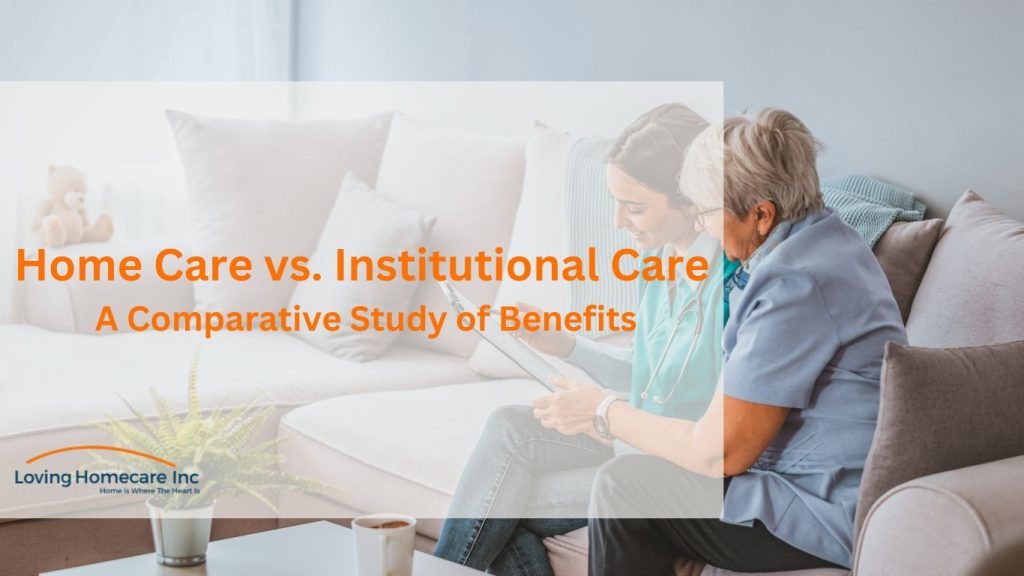Recently updated on January 20th, 2026 at 01:35 pm
One of life’s most painfully inevitable realities (we all can relate to) is seeing our loved ones grow old. Together we experience a life filled with cherishable memories and weave the tapestry of life while love lingers in the air around us. Seeing a person, once so strong struggling with the basic routine tasks can be heartbreaking (we all have been there!).

It becomes our responsibility to embark on the journey of compassion and tenderness. We must create a haven of understanding, unwavering care, and support. There are two best ways to cater to an elderly’s health and life concerns, i.e., home care or institutional care.
If you are also struggling to choose between both options, keep on reading to make an informed decision:
Institutional Care
As the name suggests, institutional care means to ensure the well-being of your older loved ones; you shift them to a healthcare facility. Here is everything you need to know that will aid your decision-making process and ease the pain of the people you love the most:
Round-the-Clock Care: Providing Peace of Mind and Safety for Aging Loved Ones

Falling prey to chronic healthcare issues is quite common during the aging process. They always need a professional to look after them. Institutional care facilities provide round-the-clock care to older adults. They can immediately cater to emergencies to ensure seamless supervision.
Institutional care facilities provide round-the-clock care enhanced by AI-driven remote monitoring and emergency response systems, ensuring immediate attention to emergencies and seamless supervision for aging loved ones.
Even better, it provides peace of mind to families, knowing that a dedicated team of caregivers is looking after their loved ones.
Today’s institutional care also embraces innovations like companion robots and virtual reality programs, which reduce isolation and improve mood, while wearable devices enable continuous health monitoring for proactive care.
Fostering Social Interaction and Friendship in Institutional Care
Living in an institutional care setting offers opportunities for increased social interaction through group activities, digital platforms, and virtual reality experiences, fostering a sense of community and combating loneliness among residents.
Social connections can combat feelings of isolation and loneliness, improving mental and emotional well-being.
Enhancing Quality of Life Through Expertise and Comprehensive Care
Institutional care facilities often provide specialized care services, including AI-driven rehabilitation therapies, robotics for mobility assistance, and comprehensive medical monitoring, which may not be readily available in a home care setting.
The availability of these specialized services within the facility can be advantageous, particularly for individuals with complex medical conditions or those requiring extensive rehabilitation.
Liberating Family Caregivers while Offering the Best Alternative
Institutional care can provide much-needed relief for family caregivers who may be experiencing physical, emotional, or financial strain due to caregiving responsibilities. Entrusting the care of their loved ones to a professional team allows family members to focus on their own well-being, career, and personal lives while ensuring that their loved ones receive the necessary care and support.
Home Care

In the comfort of home, where there are love and memories in every corner, lies an opportunity to care for our elderly loved ones. Home care services hold the power to provide more than just physical assistance; it is a hallmark of the family bond.
The essence of compassion can help older adults to live a quality life and get back the love they have invested in you. Here are the benefits of in-home care that you must know:
Familiarity and Comfort: The Embrace of Belonging
The familiarity with the walls of a home gives a deep sense of belonging. For the elderly, this is a lifeline—a testament to a life well-lived and moments cherished. The sights, scents, and sounds of their personal space offer relief and a connection to their past, providing a refuge where they can find comfort, security, and the assurance that they are genuinely ‘home.’
Everything just works in coherence to bring an escape from the pain and health-related difficulties, thus, enhancing the quality of life.
Nurturing Aging Souls in the Comforts of Home through Personalized Home Care
Aging works differently for every individual. Some may suffer from physical pain, while others struggle with mental health difficulties.
In-home caregivers, supported by AI and data analytics, are guided by empathy to create personalized care plans that address individual health status and preferences, making life happier and healthier for those in need.
From assistance with activities of daily living help to companionship and emotional support, every aspect of care is tailored to honor the unique journey of the elderly person. With this personalized touch, your loved ones can find the peace and solace they need the most!
Furthermore, home care now integrates smart home technologies—such as voice assistants, automated lighting, and remote monitoring—along with telemedicine services, allowing seniors to access healthcare professionals from home and maintain independence safely.
Promoting Independence

Change does not necessarily work well for everyone. Institutional care might limit the routine for aging souls, making it hard for them to blend with the new surroundings. However, independence becomes a vibrant force at home and empowers older adults beyond physical limitations.
The familiar spaces and routines, augmented by smart home devices and wearable health trackers, allow older people to express their autonomy and maintain independence with enhanced safety and support.
Whether it’s tending to a garden, pursuing a lifelong passion, or simply reveling in the quietness of their thoughts, elderly care at home fosters an environment where the aging soul can experience the freedom to live on their terms.
Nurturing Heartfelt Connections
At the heart of home care services lies the power to create a sanctuary of love—a place where the most profound connections flourish. Caregivers not only attend to the physical needs of the elderly but also invest in developing deep and meaningful relationships.
They become companions, confidants, and pillars of emotional support, lending an empathetic ear and a gentle touch. The bonds formed within the walls of home care become lifelines, offering relief and support during moments of vulnerability, joy, and celebration.
Peace of Mind for Families: Sharing the Love and Responsibility
For families, choosing senior home care for their elderly loved ones brings peace of mind. They are assured that their cherished family member is in the loving embrace of home, with safety enhanced by remote monitoring systems and AI-driven fall detection, cared for by compassionate professionals.
Home care allows families to share the burden of caregiving, knowing their loved one’s needs are met with expertise and untiring dedication. It creates a sense of unity as the entire family participates in the journey of caring for someone who has invested their life to uplift them.
Do you know what matters more? Seeing a happy and healthy family around boosts the longevity of your aging loved one. To make that happen, you must take good care of yourself instead of overburdening yourself while trying to do it all! Seeking help always works!
Lowering the Economic Strain for Family
In some instances, home care can be a more cost-effective option compared to institutional care. The costs associated with maintaining a home and receiving care services can be lower than the fees related to long-term institutional care. Additionally, individuals and families have the flexibility to choose the specific services they require, potentially reducing extensive expenses.
Conclusion
Choosing between home care and institutional care is a deeply personal decision that depends on various factors, including the individual’s health condition, preferences, and support system. According to research by Cochrane Library, it is hard to pick between both options.
Home care offers the advantages of familiarity, individualized care, independence, and potential cost savings. Institutional care, on the other hand, provides round-the-clock supervision, social interaction, specialized care services, and relief for family caregivers.
It is crucial to thoroughly evaluate these factors and consult with healthcare professionals and family members to determine the best care option that suits the individual’s needs and promotes their overall well-being.
Ultimately, the goal is to ensure a safe and nurturing environment that supports your aging loved one’s physical, emotional, and social needs in the best possible manner.
FAQs
In-home caregivers provide physical assistance, emotional support, and a listening ear, promoting a sense of well-being and reducing feelings of loneliness. Additionally, in-home care brings peace of mind to families, knowing their loved ones receive professional and reliable care in a place with so much meaning and significance.
They also offer companion care, engaging seniors in meaningful conversations and activities that stimulate their minds and fight feelings of loneliness. In-home care promotes independence by allowing seniors to remain in the comfort of their homes, preserving their autonomy and dignity.
It provides peace of mind for seniors and their families, knowing that reliable and compassionate care is available whenever needed.
In-home care provides personalized attention, tailoring care to meet the unique needs and preferences of each individual. It fosters a more intimate and one-on-one caregiver-client relationship, promoting a higher level of trust and emotional support.
Additionally, in-home care allows for more flexibility and individualized scheduling, ensuring seniors receive the necessary care on their terms. Overall, in-home care offers seniors a more personalized, comfortable, and empowering experience.
